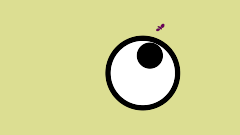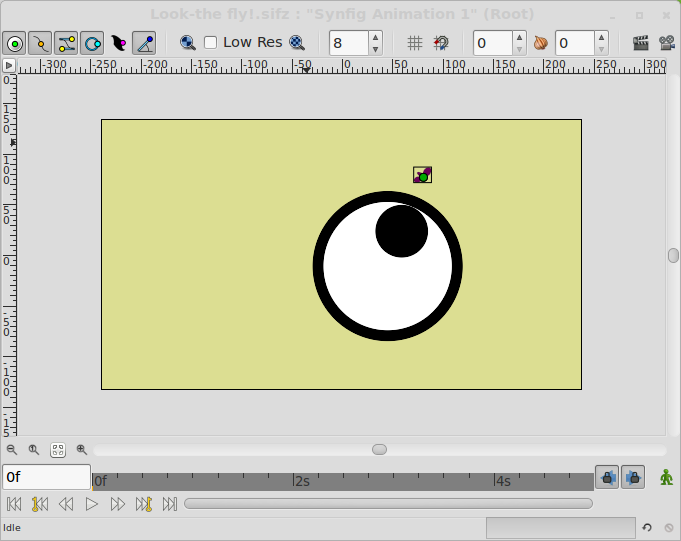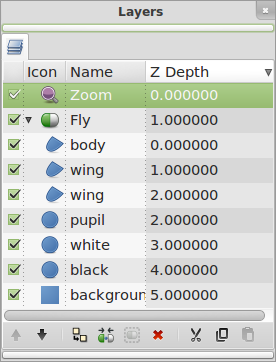Point to one object
m (→Export some parameters: typos) |
(→Export some parameters) |
||
| Line 32: | Line 32: | ||
* Then go to the 'white' layer and the 'black' layer and select both at the same time. You can do this holding CTRL meanwhile you click on the layers. Once selected both, the paramters on the Parameter layer are slightly different. The common parameters are shown (in this case all them because the layers are the same type) but the parameters that have different values are greyed indicating that. | * Then go to the 'white' layer and the 'black' layer and select both at the same time. You can do this holding CTRL meanwhile you click on the layers. Once selected both, the paramters on the Parameter layer are slightly different. The common parameters are shown (in this case all them because the layers are the same type) but the parameters that have different values are greyed indicating that. | ||
* Do right click to the Origin parameter and select 'Link'. That would allow to move the origin of both circles as one. | * Do right click to the Origin parameter and select 'Link'. That would allow to move the origin of both circles as one. | ||
| − | * Now select | + | * Now select the 'white' layer. |
| − | * | + | * Repeat the right click on the Origin parameter and you'll obtain other contextual menu. |
* Select 'Export' and name the value node to be 'origin' | * Select 'Export' and name the value node to be 'origin' | ||
| + | * Select the Radius parameter and do right click and select 'Export' and name it as 'white radius'. | ||
* Go to the 'pupil' layer and select the Radius parameter of the circle. | * Go to the 'pupil' layer and select the Radius parameter of the circle. | ||
* Right click and select 'Export'. Give the name of 'pupil radius'. It will be used later. | * Right click and select 'Export'. Give the name of 'pupil radius'. It will be used later. | ||
== Convert some parameters == | == Convert some parameters == | ||
Revision as of 10:42, 3 March 2012
Contents
Introduction
The object of this tutorial is that achieve that one object points to other regardless the movement of both objects. For this tutorial I've selected one moving eye following one mofing fly. This is the result you'll obtain:
Create the objects to move
First lets create the fly. In this case I've drawn three regions emulating the two wings and the body. Once created with the BLine Tool, encapsulate them into a Paste Canvas Layer.
Then create the Eye. To create it I simply create three Circle Layers: One black in the background (countour of the eyeball), one white in the middle (white eyeball) slightly smaller than the black one, and one smaller black for the pupil. Once created place them in that order and below the fly paste canvas layer.
Add a Solid Color layer for the background and move it down to the bottom.
We are ready to start to make the magik ;)
It should look like this (I have a zoom to make a close up screenshot):
Export some parameters
- First go to the Paste Canvas layer that holds the fly and select the Origin parameter.
- Right click it and select 'Export' and give the name of 'fly'.
- Then go to the 'white' layer and the 'black' layer and select both at the same time. You can do this holding CTRL meanwhile you click on the layers. Once selected both, the paramters on the Parameter layer are slightly different. The common parameters are shown (in this case all them because the layers are the same type) but the parameters that have different values are greyed indicating that.
- Do right click to the Origin parameter and select 'Link'. That would allow to move the origin of both circles as one.
- Now select the 'white' layer.
- Repeat the right click on the Origin parameter and you'll obtain other contextual menu.
- Select 'Export' and name the value node to be 'origin'
- Select the Radius parameter and do right click and select 'Export' and name it as 'white radius'.
- Go to the 'pupil' layer and select the Radius parameter of the circle.
- Right click and select 'Export'. Give the name of 'pupil radius'. It will be used later.
Convert some parameters
| Language: |
English |


